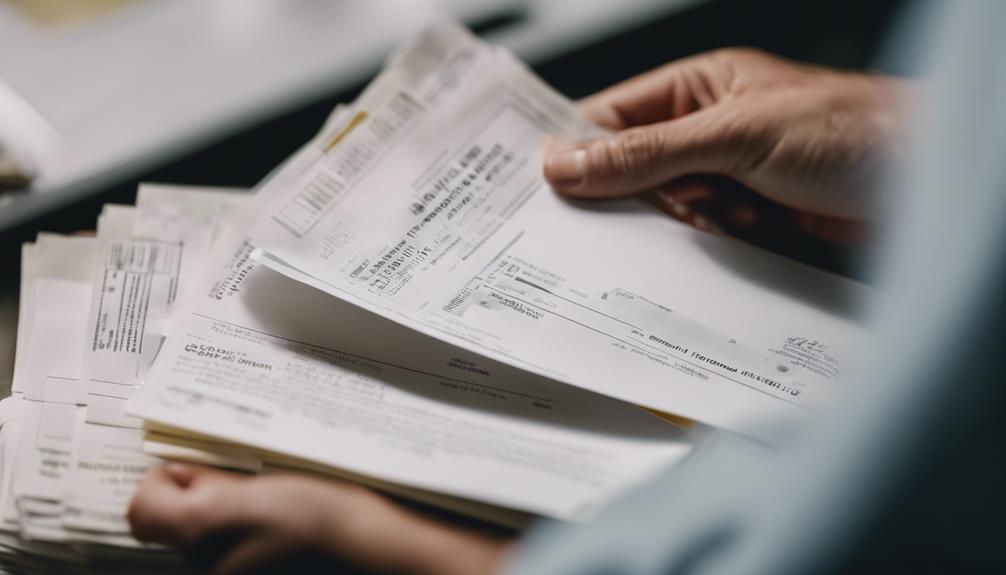When applying for Maryland Medicaid, ensure you have your driver's license, ID card, passport or birth certificate for personal identification. Provide accurate income verification with pay stubs, tax returns, or employer confirmation. Submit recent proof of residency like utility bills, and keep your name on these documents. Include medical insurance proof, financial statements of medical expenses, and clear invoices. Lastly, gather all needed documentations efficiently to boost your application process. Completing this step diligently is key to a successful Maryland Medicaid application.
Required Personal Identification
To apply for Maryland Medicaid, you must provide your valid personal identification documents for ID verification as part of the application process. Your identification documents play a crucial role in confirming your identity and ensuring that the information provided is accurate.
Typically, acceptable forms of identification include a driver's license, state-issued ID card, passport, or birth certificate. It's essential to ensure that these documents are current and not expired to avoid any delays in the application process.
During the application process, you'll be required to upload clear, legible copies of your identification documents. Make sure that all information on the documents is visible and matches the details you have provided in your application.
Any discrepancies or inconsistencies could lead to additional verification steps, prolonging the approval process. By submitting accurate and up-to-date identification documents, you can streamline the ID verification process and expedite your Maryland Medicaid application.
Income Verification Documents
When submitting your Maryland Medicaid application, ensure you include accurate and up-to-date income verification documents to support your eligibility assessment. Income verification is crucial to determine your eligibility for Medicaid benefits.
You'll need to provide documents that detail your employment history and current income status. This may include pay stubs, tax returns, or a letter from your employer confirming your wages.
In addition to income verification, asset verification is also essential. This involves providing documentation of your assets such as bank statements, property deeds, or investment records. These details help assess your overall financial situation accurately.
Your employment history is a key factor in determining your Medicaid eligibility. Be prepared to provide information about your current job, any previous employment, and any sources of income you may have.
Ensuring all income verification documents are complete and up-to-date will help expedite the processing of your Maryland Medicaid application.
Proof of Residency
Ensure your Maryland Medicaid application includes valid proof of residency to establish your eligibility for benefits. Residency verification is crucial in demonstrating that you're a resident of Maryland and meet the eligibility requirements for Medicaid.
Accepted forms of address proof for residency verification typically include utility bills, lease agreements, mortgage statements, or official government correspondence with your name and address. Make sure the documents are recent and accurately reflect your current address.
When submitting your proof of residency, ensure that the documents are in your name or have your name listed as a resident at the address provided. If you're using a joint document, such as a lease or utility bill, ensure that your name is clearly visible on the document.
Medicaid requires accurate and up-to-date proof of residency to prevent any delays in processing your application.
Medical Expense Records
Valid documentation of your medical expenses is a critical component of your Maryland Medicaid application to demonstrate your eligibility for benefits.
When submitting your application, it's essential to include proof of insurance coverage, such as copies of your insurance policies or cards. These documents show the extent of your coverage and help Medicaid assess your need for additional assistance.
Alongside insurance coverage, providing detailed financial statements outlining your medical expenses is crucial. Include invoices, receipts, and statements from healthcare providers detailing the services received and the associated costs. These records give Medicaid a comprehensive view of your medical expenditures and financial situation, aiding in determining your eligibility for assistance.
Make sure to organize these documents accurately and present them in a clear and concise manner to support your application effectively.
Additional Supporting Documentation
Including a variety of additional supporting documentation alongside your medical expense records strengthens your Maryland Medicaid application. Supporting documents such as proof of income, identification, and residency are crucial for meeting the eligibility criteria. When submitting your application, ensure you have all the necessary documentation to support your case.
During the application process, be prepared to provide documentation that proves your income level, which is a key factor in determining Medicaid eligibility. This can include pay stubs, tax returns, or a letter from your employer. Additionally, you'll need to submit identification documents, such as a driver's license or passport, to verify your identity.
Residency documentation is also vital. You may be required to provide utility bills, rental agreements, or other documents that show you're a resident of Maryland. These supporting documents help verify the information you provide in your application and ensure that you meet all documentation requirements for Maryland Medicaid eligibility.
Be thorough in gathering and organizing these additional supporting documents to strengthen your application.
Conclusion
In conclusion, remember to gather all the essential documents for the Maryland Medicaid application process. Ensuring you have the required personal identification, income verification documents, proof of residency, medical expense records, and any additional supporting documentation will streamline the application process.
By being organized and thorough in your documentation, you can increase your chances of successfully completing the application process and accessing the healthcare benefits you need.
Stay savvy and secure your Medicaid support today!
